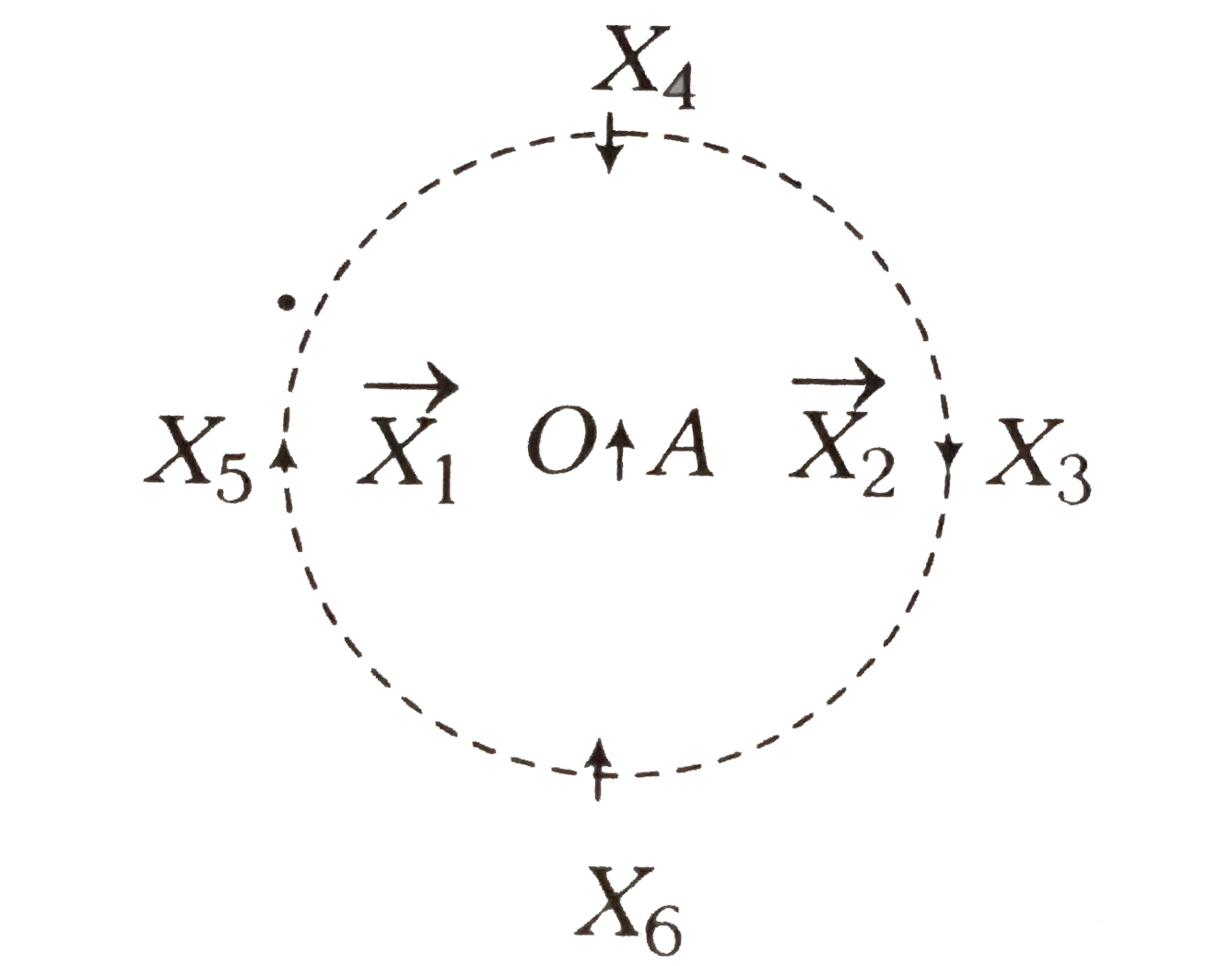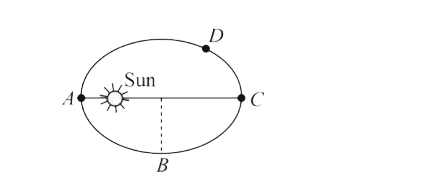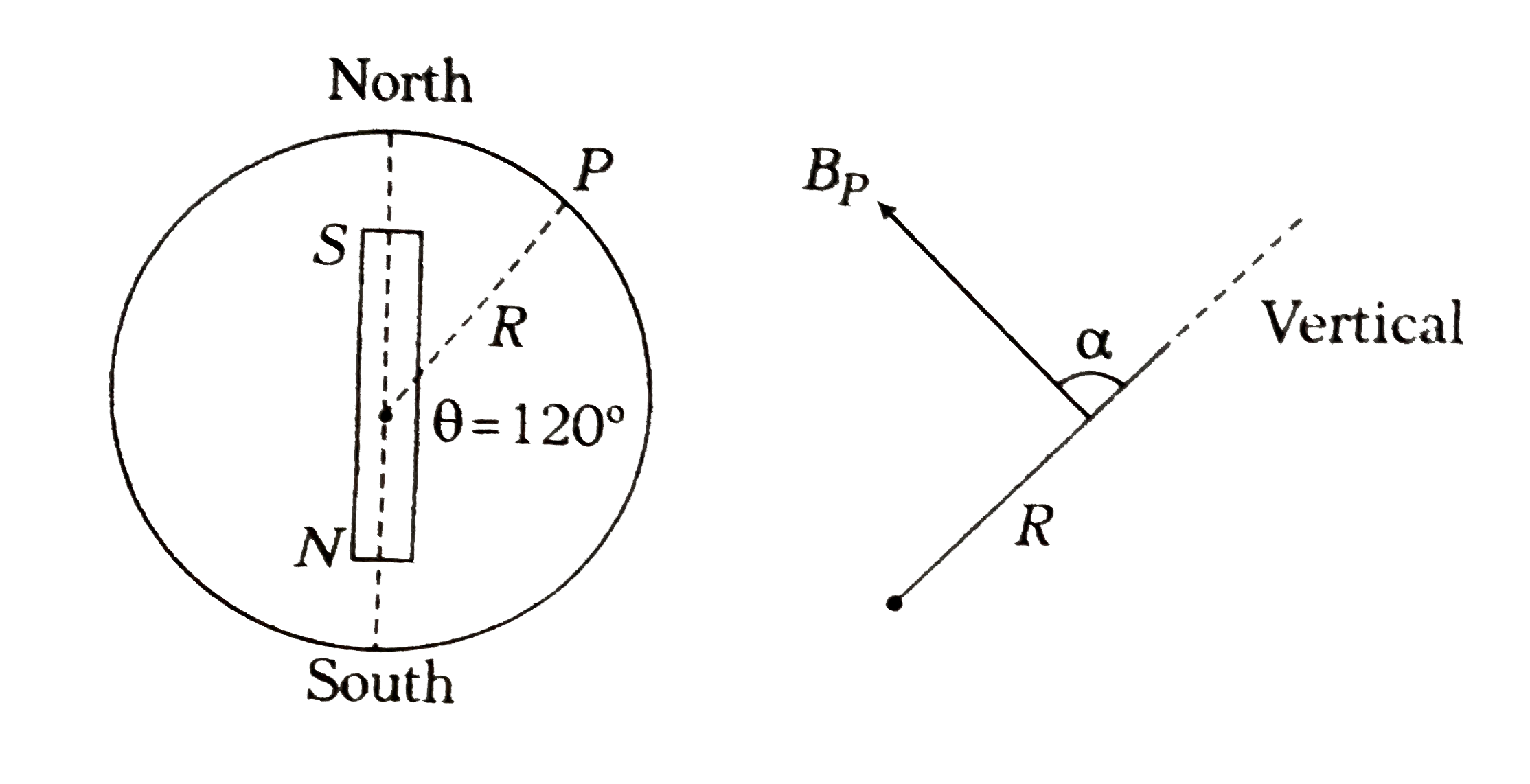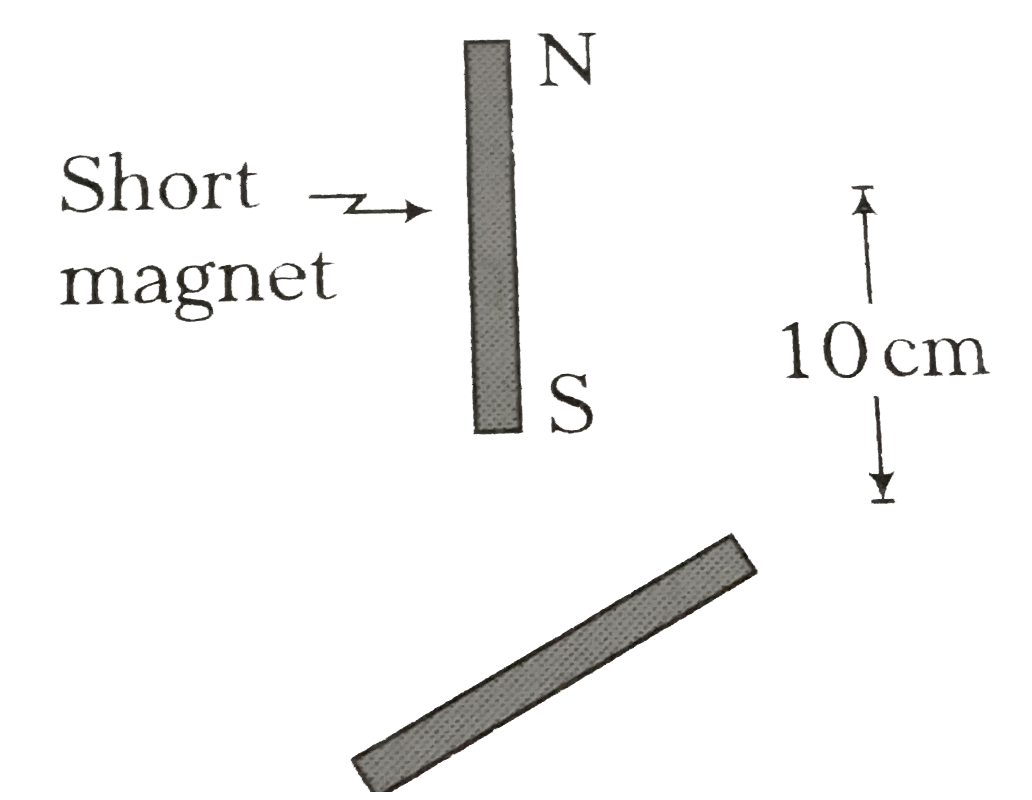Complete Solutions to EXAMPLE of chapter MAGNETISM AND MATTER of Class 12 book with complete answers and questions
| Class 12 | PHYSICS |
| Chapter | MAGNETISM AND MATTER |
| DC PANDEY NEET | EXAMPLE |
| Number Of Questions | 50 |
| Academic Year | 2023-24 |
Consider a sort magnetic dipole o f magnetic length 10cm. Find its geometric length.
View SolutionA thin bar magnet of length 2L is bent at the mid-point so that the angle between them is `60^(@)`. The new length of the magnet is
View SolutionA steel wire, of length l has a magnetic moment M. Its is then bent into a semi-circular arc. The new magnetic moment is
View SolutionTwo magnetic poles, one of the which is four times stronger than the other, exert a force of 10gf on each other when placed at a distance of 20cm. Find the strength of each pole.
View SolutionTwo similar magnetic poles, having pole strengths in the ration 1:3 and placed 1m apart. Find the point where a unit pole experiences no net force due to these two poles
View SolutionFind the magnetic field due to a dipole of magnetic moment `3Am^(2)` at a point 5m away from it in the direction making angle of `45^(@)` with the dipole exists
View SolutionA bar magnet of length 0.1m has pole strength of 50A-m. Calculate the magnetic field at distance of 0.2m from tis centre on
(i) its axial line and (ii) it equatorial line.
View SolutionCalculate the magnetic induction at a point 1 away from a proton, measured along its axis of spin. The magnetic moment of the proton is `1.4xx10^(-26)A-m^(2)`
View SolutionA short bar magnet has a magnetic moment of `0*48JT^-1`. Give the direction and magnitude of the magnetic field produced by the magnet at a distance of `10cm` from the centre of the magnet on (i) the axis (ii) the equatorial line (normal bisector) of the magnet.
View SolutionA current of 6A is flowing through a 20 turns circular coil of radius 5cm.The coil lies in the xy-plane. What is the magnitude and direction of the magneitc dipole moment assocaited with it?
View SolutionA current I flows in a conducting wire of lenth L. If we bent it in a circular form, then calculate its magnetic dipole moment.
View SolutionThe electron in hydrogen atom moves with a speed of `2.2xx10^(6)m//s` in an orbit of radius `5.3xx10^(-11)cm`. Find the magnetic moment of the orbiting electron.
View SolutionA closely wound solenoid of 800 turns and area of cross section `2*5xx10^-4m^2` carries a current of `3*0A`. Explain the sense in which the solenoid acts like a bar magnet. What is its associated magnetic moment?
View SolutionA magnetic of magnetic moment placed along the X-axis in an magnet field .Find the torque acting on the magnetic field
View SolutionA bar magnet when placed at an angle of `30^(@)` to the direction of magnetic field of `5xx10^(-2)`T, experiences a moment of couple `2.5xx10^(-6)`. If the length of the magnet is 5cm, then what will be its pole strength?
View SolutionThe work done in turning a magnet of magnetic moment 'M' by an angle of `90^(@)` from the meridian is 'n' times the corresponding work done to turn it through an angle of `60^(@)`, where 'n' is given by
View SolutionA bar magnet of magnetic moment `2.0` `A-m^2` is free to rotate about a vertical axis through its centre. The magnet is released from rest from the east west position. Find the kinetic energy of the magnet as it takes the north south position. The horizontal component of the earth's magnetic field as `B=25muT`. Earth's magnetic field is from south to north.
View SolutionA short bar magnet of moment `0*32JT^-1` is placed in a uniform external magnetic field of `0*15T`, if the bar is free to rotate in the plane of the field, which orientations would correspond to its, (i) stable and (ii) unstable equilibrium? What is the potential energy of the magnet in each case?
View SolutionConsider the situation shown in the diagram, where A small magnetised needle A is placed at a centre marked, as O. The direction of its mangetic moment I s indicated by arrow. The other arrow show different position (and orientations of the magnetic moment) of antoher identical magnetised eedle X.
In which configuration the system is not in equlibrium?
(ii) In which configuration is the system in (a) stable and (b) unsable equilibrium
(iii) Which configuration corresponds to the lowest potentials energy among all the configuration shown

View SolutionA magnetic needle is free to oscillate in a uniform magnetic field as shown in the figure. The magnetic moment of magnetic needle `7.2Am^(2)` and moment of inertia `I=6.5xx10^(-6)kgm^(2)`. The number of oscillation performed in 5s are 10. Calculate the magnitude of magnetic field?
View SolutionA compass needle whose magnetic moment is `60Am^(2)` pointing geographical north at a certain place where the horizontal component of earth's magnetic field is `40 xx 10^(-6) Wbm^(-2)` experiences a torque of `1.2 xx 10^(-3)Nm`. The declination of the place is
View SolutionIn the magnetic meridian of a certain place, the horizontal component of earth's magnetic fied is `0.26 G` and the dip angle is `60^@`. Find
a. Vertical component of earth's magnetic field
b. the net magnetic field at this place
View SolutionThe horizontal and veritical components of eaths's field at a place ar 0.22 gauss of 0.38 gauss, respectively. Calculate the angle of dip and resultant intensity of earth's field.
View SolutionA planet revolves around the sun in an elliptical orbit. The linear speed of the planet will be maximum at:

View SolutionA magnetic needle suspended in a vertical plane at `30^@` from the magnetic meridian makes an angle of `45^@` with the horizontal. Find the true angle of dip.
View SolutionA ship is to reach a place of `10^(@)` south of west. In which direction should it be steered if the declination at the place is `18^(@)` west of north.
View SolutionA dip circle shows an apparent dip of `45^(@)` at a place where the true dip is `30^(@)` . If the dip circle is rotated through `90^(@)`, what apparent dip will it show?
View SolutionA short magnet `(M=4xx10^(-2))` lying in a horizontal plane with its north pole points `37^(@)` east of north. Find the net horizontal field a ta point of the magnet of 0.1m away from it `(B_(h)=11muT)(sin37^(@)=3//5,cos37^(@)=4//5)`
View SolutionThe earth's magnetic field at geomagnetic poles has a magnitude `8xx10^(-5)T`. Find the magnitude and the direction of the field at a point on the earth's surface where the radius makes an angle of `120^(@)` with its axis of the earth's assumed magnetic dipole. What is the inclination dip at this point?

View SolutionA bar magnet `30cm` long is placed in magnetic meridian with its north pole pointing south. The neutral point is observed at a distance of `30cm` from its centre. Calculate the pole strength of the magnet. Given horizontal component of earth's field is `0*34G`.
View SolutionA short bar magnet is placed with its north pole pointing north. The neutral point is `10 cm` away from the centre of the magnet. If `H=0.4G`, calculate the magnetic moment of the magnet.
View SolutionIn a tangent galvanometer, when a current of `10mA` is passed, the deflection is `31^@`. By what percentage, the current has to be increased, so at to produce a deflection of `42^@`?
View SolutionThe coil of a tangent galvanometer of radius 12cm is having 200turns. If the horizontal component of earth's magnetic field is `25muT`. Find the current which gives a deflection of `60^(@)`.
View SolutionA bar magnet of length 5cm, width 3cm and height 2cm takes 5s to complete an oscillation in viberation magnetometer placed in a horizontal magnetic field of `20muT`. The mass of this bar magnet is 250g(a). Find the magnetic moment of the magnet. (b) If the magnet is put in the magnetormer with its 0.5cm edge horizontal, what would be the new time period?
View SolutionA magnetic needle performs `20` oscillations per minute in a horizontal plane. If the angle of dip be `30^@`, then how many oscillation per minute will this needle perform in vertical, north south plane and in vertical east -west plane?
View SolutionA magnet performs 15 oscillations per minute in a horizontal plane, where angle of dip is `60^(@)` and earth is total field is 0.5G. At another place, where total field is 0.6G, the magnet performs 20 Oscillation per minutes. What is the angle of dip at this place.
View SolutionThe time period of viberation of two magnets in sum position (magnets placed with similar poles on one sides one above the other) is 3s. When polarity of weaker magnet is reversed the combination makes 12 oscillations per minutes. What is the ratio of magnetic moments of two magnets?
View SolutionA small bar magnet having a magnitic moment of `9xx10^(-3)Am^(-2)` is suspended at its centre of gravity by a light torsionless string at a distance of `10^(-2)m` vertically above a long, straight horizontal wire carrying a current of 1.0A from east to west. Find the frequency of oscillation of the magnet about its equilibrium position. The moment of inertia of the magnet is `6xx10^(-9)kgm^(2)`.(`H=3xx10^(-5)T`).
View SolutionA thin rectangular magnet suspended freely has a period of oscillation equal to `T`. Now it is broken into two equal halves (each having half of the original length) and one piece is made to oscillate freely in the same field. If its period of oscillation is `T^(')`, then ratio `T^(')/T` is
View SolutionThe time period of the magnetic in an oscillation pmagnetometer in the earth magnetic field is 2s. A short bar magnet is placed to the north of the magnetometer, at a separation 10cm from the oscillation magnet, with its north pole pointing towards north. The time period beceomes half. Calculate the magnetic moment of this short magnet.

View SolutionThe magnetic moment of a magnet `(15cmxx2cmxx1cm) is 1.2A-m^(2)`. Calculate its intensity of magnetisation
View SolutionRelative permeability of iron is 5500, then its magnetic susceptibility will be
View SolutionThe magnetic field of 20CGS units produces of a flux of 2400 CGS units in a bar of cross section `0.2cm^(2)` Calculate the (i) permeability and (ii) susceptibility of the bar.
View SolutionA solenoid having 2000 turns/m has a core of a material with relative permeability 220. The area of core is `4cm^(2)` and carries a current of 5A. Calculate (a) Magnetic intensity (b) Magneic field (c ) Magnetisation (I) of the core Also calculate the pole strength developed.
View SolutionThe space within a current carrying solenoid is filled with magneisum having magnetic suscepitbiliy. `x=M_(g) =1.2xx10^(-5)`. What will be the percentage increase in magnetic field?
View SolutionConsider a bar magnet having pole strength 2A-m, magnetic length 4cm and area of cros-section `1cm^(2)` Find
(I) the magnetisation I
(II) the magneic intensity H and
(III) the magnetic field at the centre of magnet
View SolutionThe magnetic susceptibility of a paramagnetic material at `-73^(@)C "is" 0.0075`, its value at `-173^(@)C` will be
View SolutionA solenoid having 5000 turns/m carries a current of 2A. An aluminium ring at temperature 300K inside the solenoid provides the core, (a) If the magnetisation I is `2xx10^(-2)A/m`. Find the susceptibility of aluminium at 300K (b) If temperature of the aluminium ring is 320K, what will be the magnetisation ?
View SolutionThe hysteresis loss for a specimen of iron weighing 15kg is equivalent at `300Jm^(-3)cycle^(-1)` Find the loss of energy per hour at 25 cycle `s^(-1)`. Density of iron is `7500kg m^(-3)`
View SolutionThe coercive force for a certain permanent magnet is `4.0 xx 10^4 A m^(-1)`. This magnet is placed inside a long solenoid of 40 turns/cm and a current is passed in the solenoid to demagnetize it completely. Find the current.
View Solution
EXAMPLE questions and complete solutions for chapter MAGNETISM AND MATTER of DC PANDEY ENGLISH of Class 12